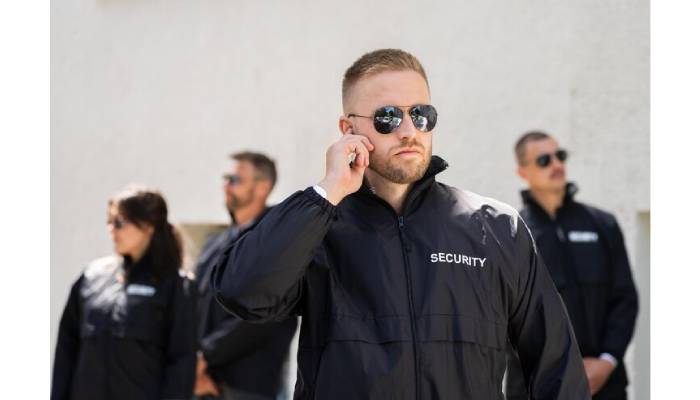
Assessing the quality of security guard services isn’t just about hiring bodies for protection; it requires a thorough evaluation of several factors. Begin by clearly defining what you expect from the security team. Their professional qualifications matter, so check for valid training and necessary certifications to ensure they are prepared. Experience in the field holds weight, too—looking into reviews and past client satisfaction helps gauge reliability. Establish performance metrics like response times and incident reporting accuracy to monitor effectiveness actively. Also, be mindful of how well security personnel communicate with others; clear communication can make all the difference in emergencies.
1. Define Your Security Service Expectations
To effectively assess security guard services in Los Angeles, start by clearly defining your service expectations. Outline the specific roles and responsibilities you expect from security personnel based on the nature of your property, whether it’s retail, corporate, or residential. For example, a retail environment may require guards to monitor customer behavior, manage theft prevention, and assist with crowd control during busy hours, while a corporate setting may focus on access control and employee safety. Establishing clear security objectives not only helps in selecting the right service provider but also sets the foundation for measuring performance later on. By aligning your expectations with the unique needs of your property, you can ensure a more tailored and effective security approach.

2. Verify Professional Qualifications of Guards
When assessing security guard services, it’s crucial to verify the professional qualifications of the guards. Start by checking their training and certifications. Look for credentials in CPR, first aid, and any specialized training relevant to the specific security needs of your environment. For example, guards working in a healthcare setting should have additional training in handling medical emergencies.
Additionally, ensure that all guards have undergone thorough background checks and possess the necessary licenses as mandated by local laws. This not only ensures their reliability but also boosts your confidence in their ability to handle critical situations. A well-qualified guard is not just a deterrent; they are trained responders who can effectively manage emergencies and maintain safety. By confirming these qualifications, you lay a solid foundation for a trustworthy security service.
3. Assess Company Experience and Reputation
When evaluating security guard services, the experience and reputation of the company play a crucial role. A well-established firm typically has a proven track record, which can be a strong indicator of reliability. For instance, a company that has been in the industry for over a decade is likely to have encountered a variety of situations, honing their skills and refining their procedures. Additionally, it’s important to check references and reviews from past clients. Look for testimonials that highlight not just the effectiveness of the guards, but also their professionalism and responsiveness. Online platforms and local business directories can provide insights into customer satisfaction. A company with numerous positive reviews is usually more trustworthy than one with mixed or negative feedback, as this reflects their commitment to quality service. Don’t hesitate to reach out to previous clients directly to ask about their experiences—this can provide a deeper understanding of what to expect.
4. Establish Key Performance Metrics
Key performance metrics (KPIs) are essential for assessing the quality of security guard services. Start by identifying specific KPIs that align with your security objectives. For instance, you might track response times to incidents, which can reveal how quickly security personnel react to emergencies. Another critical metric is the accuracy of incident reports, as thorough documentation is vital for understanding security events and improving protocols. Customer feedback is also valuable; gathering insights from clients and the public can highlight areas for improvement and reinforce strengths.
Regular performance reviews should be conducted to evaluate these metrics. For example, if a security guard consistently performs well in response times but receives low scores in customer interaction, this could indicate a need for additional training in communication skills. Establishing a structured evaluation process ensures that security personnel are not only meeting expectations but are also continually developing their skills to adapt to changing environments.
5. Evaluate Communication Skills of Staff
The communication skills of security staff play a crucial role in their effectiveness. You should assess how well they interact with the public, as this can impact the overall safety and comfort of your property. Security personnel should be able to convey information clearly and effectively, whether they are addressing a routine inquiry or managing a tense situation. For instance, if a visitor has a question about building access or safety protocols, the guard’s ability to provide a clear and concise response can enhance the visitor’s experience and reinforce a sense of security.
Furthermore, training in communication can help security staff navigate various scenarios, from conflict resolution to emergency situations. For example, during a crisis, a guard’s calm and clear communication can guide people to safety, while also ensuring that the right information is relayed to emergency responders. Evaluate whether the security service offers training programs that focus on communication skills, as this can be a significant indicator of their commitment to quality service.
6. Review Technology Utilization
Evaluating the technology used by security guard services is essential in today’s digital age. Security firms should implement advanced surveillance systems, alarm systems, and communication tools to enhance their effectiveness. For instance, a company using high-definition cameras with remote monitoring capabilities can quickly respond to incidents and improve overall safety. Additionally, security personnel must be trained to utilize these technologies effectively. Proper training ensures that guards can operate equipment, interpret data correctly, and respond appropriately to alerts. When assessing a security service, inquire about their tech capabilities and the training programs in place for staff. A firm that embraces technology is often better equipped to handle modern security challenges.
- Types of security technology used (CCTV, alarms, access control)
- Integration of security systems for centralized monitoring
- Use of mobile technology for guard reporting
- Real-time data analytics and incident reporting
- Compliance with industry standards and regulations
- Training staff on the latest technology and tools
- Availability of technical support and maintenance services
7. Analyze Crisis Management Procedures
Evaluating crisis management procedures is a crucial step in assessing the quality of security guard services. You should start by reviewing the security firm’s established protocols for various emergency scenarios, such as fire, medical emergencies, or intrusions. A solid plan includes clear evacuation routes, roles for security personnel, and communication strategies that ensure everyone knows what to do when a crisis occurs.
For instance, consider if the security team conducts regular drills to practice these procedures. Drills not only test the effectiveness of the protocols but also help personnel become familiar with their roles, boosting their confidence. In addition, check if the security firm has a system for communicating with local authorities during emergencies, which is vital for quick responses.
8. Check Customer Service Orientation
The way security personnel interact with clients, visitors, and employees is crucial. Their ability to maintain a balance between authority and approachability can significantly impact the overall environment of the property. For instance, a security guard who greets visitors warmly while remaining vigilant demonstrates professionalism and enhances the overall experience. It’s essential to observe how they handle inquiries or conflicts. A good security service will train their guards to be not only watchful but also approachable, ensuring that people feel safe and respected. Monitoring these interactions can provide valuable insights into the quality of service being offered.